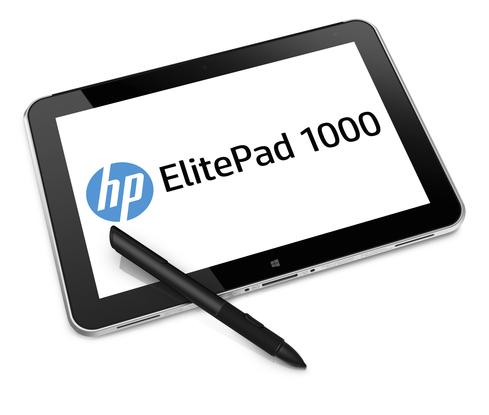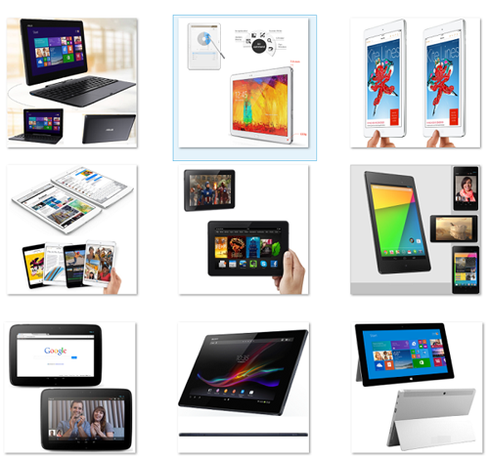Can HP Jumpstart Enterprise Windows Tablets?
Apple rules today's workplace tablet scene, but HP sees an opportunity for its new Windows 8.1 business slates, introduced this week at Mobile World Congress.


10 Best Tablets Of 2013
10 Best Tablets Of 2013 (Click image for larger view.)
Most tablets in the enterprise are iPads, but HP, which announced new business tablets this week at Mobile World Congress, still believes Windows slates can carve out a niche.
Windows tablets' market share has been "small to date," said Derek Everett, HP director of worldwide product management for commercial Windows tablets, in an interview. "But we see it as a high-growth area for the next few years."
The ElitePad 1000 G2 and ProPad 600, both of which debuted this week, represent the company's latest attempt to jumpstart that growth.
A replacement for HP's ElitePad 900, the 1000 G2 runs Windows 8.1 Pro and will launch in March with a base price of $739. It features a 10.1 inch, 16:10 scratch-resistant screen with 1920x1200 pixel resolution. HP says the ElitePad 1000's screen is brighter than the current model's and supports a wider range of viewing angles. These traits -- along with its sturdy, military-grade, machined aluminum body -- make it potentially well suited for field work.
[Is Windows 8.1 about to get better for desktop users? Read Microsoft Confirms Windows 8.1, Windows Phone 8 Updates.]
The ElitePad 1000 also improves on the 900 by adding LTE connectivity and, thanks to its Intel Bay Trail quad-core processor, 64 bit support. It supports pen input, includes a 2 MP front-facing camera for video chats, and an 8 MP rear-facing camera. The 1000 will be available in both 64 and 128 GB configurations, although a microSD card slot offers additional space. At a little over 9 mm thick and 1.5 pounds, it should be easy to handle.
The ProPad 600, meanwhile, is intended as a "step down" from the ElitePad, said Everett, who added that HP believes there's a demand for affordable commercial tablets. HP hasn't yet disclosed pricing for the device, which will ship in April, but given that HP needs to differentiate the ProPad from its $739 stablemate, an introductory cost well south of $700 seems certain.
The ProPad contains a lot of the ElitePad's core technology, including the screen and processor. But unlike the ElitePad, the ProPad isn't fully serviceable and doesn't boast a premium aluminum build. Perhaps most crucially, the ProPad isn't compatible with HP's "Jacket" products, which are accessories that expand the ElitePad's functionality.
HP's Smart Jackets include the Expansion Jacket, which extends the connected device's battery life, and the Productivity Jacket, which includes a built-in keyboard and USB ports. HP also offers a docking station that allows ElitePads to connect to an external monitor and function like desktops. At Mobile World Congress, the company showed off new accessories for point-of-sale applications.
Everett said HP "doesn't necessarily see [ElitePads] as PC replacements, but for light content creation, they bridge the gap between notebooks and tablets."
The size of the market represented by this gap is, of course, the dilemma facing HP and other Windows tablet vendors. The enterprise tablet market is "going to be mixed," Everett stated. "We all know there is a lot of BYOD out there."
"IT departments value the Windows 8-based tablet platform," he continued, stating that HP's Windows 8 customers choose the platform for app compatibility, security, and manageability.
Those appeals are important but so far have translated into only a niche segment of the field. The research firm IDC said in December that Windows tablets accounted for 3.4% of shipments in 2013, compared to 35% from iPads and 60.8% from Android slates. IDC projects that by 2017, Windows tablets will claim 10.2% of the market.
For now, HP sees Windows tablets appealing to certain users. "There is no 'one size fits all' solution for business tablets," said Everett. "Some people are going from a desk to conference rooms all day; some people are traveling a lot. Different needs require different [accessories] tailored to end-user need."
When asked if HP customers purchase multiple Smart Jackets so a single tablet can be used in multiple ways, Everett said that, anecdotally, he doesn't see more than one Jacket per device. He qualified, however, that Jackets and docking stations sometimes are used by people who need to work both at a desk and on the go.
Engage with Oracle president Mark Hurd, NFL CIO Michelle McKenna-Doyle, General Motors CIO Randy Mott, Box founder Aaron Levie, UPMC CIO Dan Drawbaugh, GE Power CIO Jim Fowler, and other leaders of the Digital Business movement at the InformationWeek Conference and Elite 100 Awards Ceremony, to be held in conjunction with Interop in Las Vegas, March 31 to April 1, 2014. See the full agenda here.
About the Author(s)
You May Also Like







